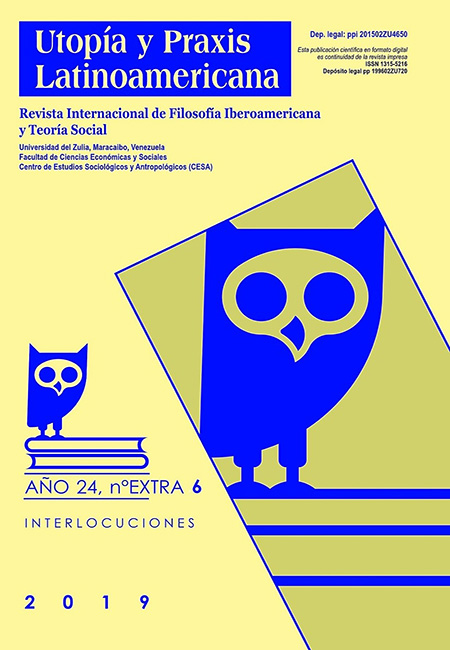Philosophical synergetic approach to the study of old age phenomenon
Resumen
ABSTRACT
Today synergetics is an interdisciplinary trend, exploring general patterns in various phenomena. Philosophical comprehension of old age as the final path of human development includes, first of all, the attitude of a person to the process of aging and to his/her own finiteness. The body is no longer able to fulfill all the functions and to meet the social requirements of mobility and general health due to the physiological changes, and the soul is “in the teeth of death” facing the necessity of addressing the existential problem of the meaning of life.
RESUMEN
Hoy la sinérgica es una tendencia interdisciplinaria, que explora patrones generales en varios fenómenos. La comprensión filosófica de la vejez como el camino final del desarrollo humano incluye, en primer lugar, la actitud de una persona hacia el proceso de envejecimiento y hacia su propia finitud. El cuerpo ya no puede cumplir con todas las funciones y cumplir con los requisitos sociales de movilidad y salud general debido a los cambios fisiológicos, y el alma está "en los dientes de la muerte" ante la necesidad de abordar el problema existencial del significado de vida.
Citas
BIBLIOGRAPHY
ANCYFEROVA, LI (2005). “Pozdnii period zhizni cheloveka: tipy stareniya i vozmozhnosti postupatel'nogo razvitiya lichnosti”. Psihologiya razvitiya: Hrestomatiya. M.
BARASHNEV, YI (1976). Nasledstvennost i zdorovye. p. 97.
BARTON, KC, & LEVSTIK, LS (2004). Teaching history for the common good. Routledge.
ERMOLAEVA, MV (2017). “Old Age as a Cultural and Historical Phenomenon and its Transformation in Modern Times”. Revue Internationale du CRIRES: Innover Dans la tradition de Vygotsky, 4(1), pp. 203-207.
FRANKL, V (1990). Chelovek v poiskakhsmysla. Moscow: Progress. p. 368.
FROMM, E (2008). Imetilibyt. Moscow: AST MOSKVA, p. 304.
ILʹIN, IA (1993). Put k ochevidnosti. Республика.
JASPERS, K (1994). The meaning and purpose of history. Moscow. p. 214.
KHAKEN, G (1999). Mozhem li my primenyat’sinergetiku v naukakh o cheloveke? [Can we use synergies in the human sciences?]. Moscow, Yanus-K, pp. 11-26.
KNYAZEVA, YN (2000). Yedinaya Nauka o yedinoy prirode. No. 3, pp. 161–178.
LEDERER, P (2015). “The quantum Hall effects Philosophical approach”. Studies in History and Philosophy of Science Part B: Studies in History and Philosophy of Modern Physics, 50, pp. 25-42.
MECHNIKOV, II (1907). Etyudy optimizma. (1988). p. 328.
MYSKIN, Y (2018). “Dialectic of Fiscal Sociology: From Ambivalence to Synergetics”. Accounting and Finance, (2), pp. 89-95.
OSELEDCHIK, M, INOZEMTSEV, V, IVLEVA, M, & IVLEV, V (2016). “Logical-Philosophical Approach to the Interpretation of the Concept of Knowledge”. In 2016 3rd International Conference on Education, Language, Art, and Inter-cultural Communication (ICELAIC 2016). Atlantis Press.
PRIGOZHIN, I (1986). Prospects for the study of complexity (“Перспективы исследования сложности"). Systems Research: Methodological Issues. Yearbook. pp. 45-75.
SCHIEPEK, G, HEINZEL, S, KARCH, S, PLÖDERL, M, & STRUNK, G (2016). “Synergetics in psychology: patterns and pattern transitions in human change processes”. In Selforganization in Complex Systems: The Past, Present, and Future of Synergetics, pp. 181-208. Springer, Cham.
VINCENT, JA (2008). “The cultural construction old age as a biological phenomenon: Science and anti-aging technologies”. Journal of Aging Studies, 22(4), pp. 331-339.
VIZIGIN VP (2007). Nitsshe i Marsel: “Smertboga” i kriziskultury. No. 4, pp. 36–55.









